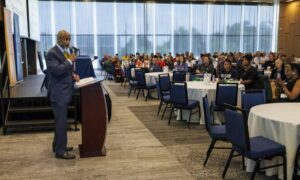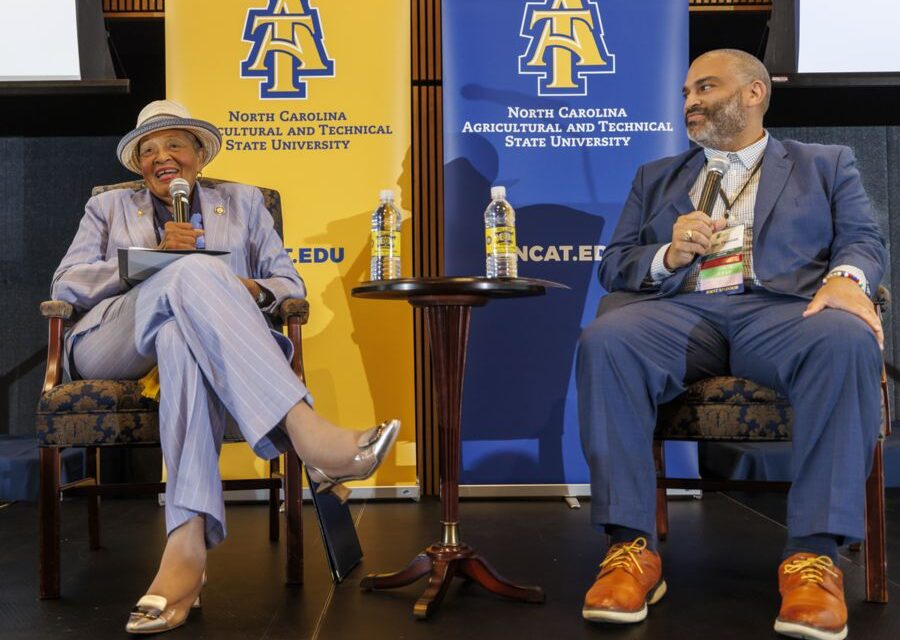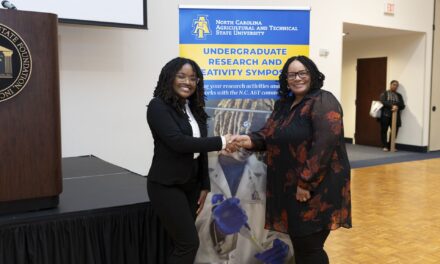The need for collaboration and mutual support among the nation’s public and land-grant universities in the face of uncertainties was a common theme at the Association of Public and Land-Grant Universities’ (APLU) summer meeting, held July 28-31 in Chapel Hill and, for the first time, at N.C. A&T and the University Farm.
More than 300 governmental affairs leaders and researchers from across the nation came to campus to discuss federal research advocacy, policy navigation and other current issues in higher education. The group also took a short tour of the 492-acre University Farm and learned about the College of Agriculture and Environmental Sciences’ research and technology projects.
Through often-candid examples drawn from experiences at their own universities, panelists and attendees transparently discussed strategies to maintain research funding and buffer higher education from political uncertainties.
“North Carolina has been ranked for three of the past four years as the number one place in the country to do business, and at the same time, we see public education as a public good,” said Chancellor James R. Martin II. “N.C. A&T’s heartbeat is research; last year, we had the lead in cybersecurity and agricultural resilience. It’s important that we have a sense of urgency to keep what made this country great and articulate the importance of our research universities.”
U.S. Rep. Alma Adams (NC-12), a two-time graduate of N.C. A&T, received APLU’s Congressional Achievement Award and shared reflections on her years of Congressional advocacy for public and land-grant universities.
“Policy is made for and about you, and most of the time, without you,” the Democrat told the group. “Know your district. Know who you’re working with. Let them know what issues you’re concerned about. Our constituents shape us.”
Adams, a former college administrator and art professor who has been nicknamed “The Godmother of HBCUs for her landmark legislative proposals, noted that there have been six different constructions of her district in her 11 years in Congress.

Chancellor James R. Martin II addresses a crowd of more than 300 public and land-grant university researchers and governmental affairs leaders.
“Those of us who have been in higher education have been relentless in defending it from people who don’t understand what higher ed is supposed to do, or how it does it,” she said.
In the afternoon, the group toured seven of the University Farm’s nine animal and horticultural units and heard presentations on such research topics as growing ginger as a high-dollar niche crop, using agricultural byproducts as a wound dressing or ways to mitigate peanut allergies. The group also got a look at the Dairy Unit’s Voluntary Milking System, the only university-based VMS in the state, and learned about plans for the Urban and Community Food Complex, an agricultural business incubator set to open this fall.
In a show of hands, most of the attendees indicated that they had never visited N.C. A&T before. Susan Martinis, Vice Chancellor for Research and Innovation at the University of Illinois at Urbana-Champaign, was among those who gained a new appreciation for the legendary land-grant HBCU.
“What I was really impressed by was the newness, the modernization, the vision of what they’re doing and how they’re really engaged with the communities around them when they’re trying to develop new innovations for them to adopt,” she said. “It was really, really exciting.”





